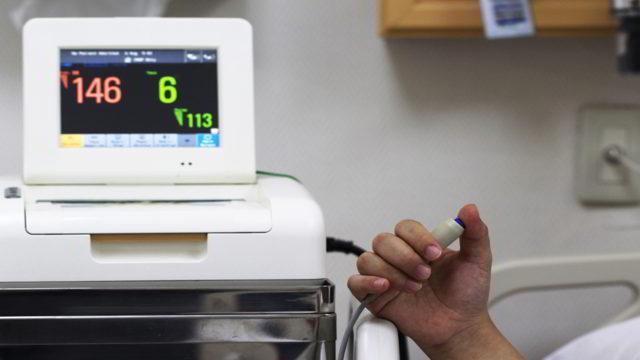Non Stress Testing

Overview
Non-stress testing is a popular prenatal test that is done to check on the health of the unborn child. The name non-stress alludes to the fact that none of it is done to stress the child’s system throughout the test. While the unborn baby is undergoing a non-stress test, their heartbeat is tracked to evaluate how it reacts to physical activities.
After twenty-six to twenty-eight weeks of pregnancy, a non-stress test can be performed to determine the status of the pregnancy. If the pregnancy is high risk a nonstress test is often advised.
Some non-stress test findings may suggest that you and the child need more surveillance, screening, or specialist care, and you should seek medical attention immediately.
Everything You Need to Know About Non Stress Testing
What is It | Services | Before And After | Choose The Best Hospital | Conclusion
What is Non-Stress Testing?
A non-stress test is a non-invasive diagnostic method that is safe for pregnant women. It’s a non-invasive procedure that does not need cutting into the surface or entering any portion of the body.
An unborn baby’s heartbeat is measured while the baby kicks about in the uterus during the test. The pulse rate of most normal unborn babies, generally known as the fetal heart rate, rises as they move about within the mother’s womb.
If the results of your nonstress test reveal that your baby’s heartbeat was higher or lower than usual, it is possible that he or she is not receiving enough oxygenation. If this occurs, you may require additional screening or treatment, and in rare situations, a preterm delivery may be planned, for this, your healthcare professional will administer medication or employ other ways to initiate early labor.
Sub Treatments For Pregnancy Care
We are one of the Best IVF Clinic in Delhi NCR!
51.8K
Subscribers
4.6 (383 reviews)
4.5 (409 reviews)
3.5 (254 reviews)

5 Out Of 5
Services
The test may be performed at a hospital that has a dedicated prenatal testing facility. Alternatively, it may be performed at the office or clinic of the healthcare provider. However, a standard nonstress test could look something like this:
- You will be asked to lay down on an examination table in a relaxed position. The provider applies gel to the area around your stomach and places a belt around your waist. A transducer, which is a small electronic gadget, is connected to the belt.
- This includes a fetal heart rate sensor that is worn externally. It is placed well over the region where the baby’s heart can be felt by the physician.
- It is possible to record the baby’s heartbeat on a screen and a paper sheet.
- Everytime you feel like your baby is kicking, you would be asked to press a button on the screen to record it.
- This examination lasts typically between 20 to 40 minutes.
There are certain circumstances when the testing is done throughout the day to record the baby’s sleep pattern, when there is a minimal fetal movement. To awake the infant, employing an acoustic device with a specific sound may be necessary. It is put on the mother’s stomach and emits a buzzing sound similar to a buzzer.
This has no negative impact on the infant. However, it may assist a drowsy infant in becoming more energetic. If you drink or eat anything, your child may also wake up.
Before and after testing
Before the non-stress test starts, your blood pressure will be measured and recorded.
After the nonstress test is completed, your healthcare professional will likely discuss findings with you.
The following are the predicted results of a nonstress test:
- Reactive – Suppose your baby’s heart rate speeds to a specific level just above benchmark repeatedly for at least 10 seconds within a 20-minute interval, then the findings are regarded normal before week 32 of pregnancy.
When the baby’s heart rate speeds to a specific level above the benchmark twice or more than that for 15 seconds during a 20-minute time frame in 32 weeks of pregnancy or beyond, then the findings are termed reactive.
- Nonreactive – As long as your baby’s heart rate does not match the requirements outlined above, the findings are nonreactive. It is possible that your infant was idle or sleeping throughout the test, which will result in nonreactive findings.
How to choose the best hospital?
When looking for the finest non-stress hospital, here are some things to keep in mind:
- Patient feedback should be checked since all hospitals rely on patient services. The rating would show the hospital’s expertise.
- The best way to choose the best medical care is to examine the physicians’ training, credentials, and expertise. It is recommended to check doctor bios and ratings before picking hospitals.
- Find a lodging community hospital you can rely on and go about effortlessly. Look for nearby hospitals and services, including drugstores, hotels, housing, and transportation. You could also check for nearby ATMs and financial transaction providers.
Conclusion
Doctors may advise you to undergo further testing if you have a nonreactive result, including biophysical profiling and a contractions stress test. However, if your physician believes that your baby’s health is in danger within the womb, they will most likely induce early birth or send you to the clinic for further monitoring.
If you have any further queries or doubts regarding non-stress testing, connect to our experts now.
Patient Testimonials
It’s always the word of mouth that’s the best advice
Published On: 3 Dec 2018
London to Gunjan IVF: Mrs. Pragya's journey of parenthood |Treated for pregnancy care | Gunjan IVF
Published On: 7 Oct 2018
We are pregnant!! | Pregnancy after Fibroid Removal Treatment (Myomectomy)| Gunjan IVF World

Erica Benn
It was such a nice experience with Dr. Gunjan and how she tackle our case. I must recommend this clinic as one of the best IVF clinic in Delhi-NCR. Thanks to Dr. Gunjan to give me my motherhood.

Nitesh Kumar Thakur
Gunjan IVF World in Indirapuram, Ghaziabad is the best hospital for surrogacy and ivf services in Delhi-NCR. Dr. Gunjan Gupta is founder and director of Gunjan IVF World. Gunjan IVF is the best ivf center in Indirapuram , Ghaziabad. Treatments at affordable prices.

Akansh Garg
Dr gunjan gupta is one of best gyne in delhi ncr especially in ghaziabad she explains each n everything very clearly to avoid any confusion. staff is very supportive n helpful.

Manisha Pathak
Went for treatment at various places in Delhi since 2012. Then came to know about Gunjan IVF. Started treatment in October 2020. The treatment is going on and we are quite hopeful. Gunjan ma'am is a very good doctor who treated me well and the staff are also very good and helpful.

Erica Benn
It was such a nice experience with Dr. Gunjan and how she tackle our case. I must recommend this clinic as one of the best IVF clinic in Delhi-NCR. Thanks to Dr. Gunjan to give me my motherhood.

Nitesh Kumar Thakur
Gunjan IVF World in Indirapuram, Ghaziabad is the best hospital for surrogacy and ivf services in Delhi-NCR. Dr. Gunjan Gupta is founder and director of Gunjan IVF World. Gunjan IVF is the best ivf center in Indirapuram , Ghaziabad. Treatments at affordable prices.

Akansh Garg
Dr gunjan gupta is one of best gyne in delhi ncr especially in ghaziabad she explains each n everything very clearly to avoid any confusion. staff is very supportive n helpful.

Manisha Pathak
Went for treatment at various places in Delhi since 2012. Then came to know about Gunjan IVF. Started treatment in October 2020. The treatment is going on and we are quite hopeful. Gunjan ma'am is a very good doctor who treated me well and the staff are also very good and helpful.
Our Expert Team
Dr. Gunjan Gupta Govil
Founder & Director
Founder, Director & Gynaecologist with specialization in IVF, Infertility & Laparoscopy of 20+ years of experience.
(20+ years of experience)

Dr. Pradyot Kumar
Founder, CEO and a specialized Neurosurgeon who is an expert in complex Brain and Spine surgeries.
(25+ years of experience)

Mr. Gaurav Singhai
COO and an entrepreneur who co-founded Gujan IVF world along with Dr Gunjan and Dr Pradyot.
(5+ years of experience)

Paritosh Sarkar
Embryologist
He is a highly experienced and successful Embryologist with more than 10 years of experience in IVF.
(10+ years of experience)
Patient Guide
Along with treating our patients, we also guide them with the help of our educational blogs and videos.
Educational Blogs

Why do blastocyst not implant?
The reasons for an unsuccessful implantation are very uncommon and rare as well. Blastocyst provides a greater chance of becoming pregnant therefore the procedure is handled properly as well.

What happens after blastocyst transfer?
Before jumping to the immediate question first let’s have a small brief of what is blastocyst transfer. Blastocyst transfer is the transfer of embryos that have achieved a higher stage of development.

Can blastocyst fall out?
Maximum patients worry about what they can do or cannot do after an embryo transfer. They have the fear that if they do something wrong, the embryo would not attach or fall out.
Educational Videos

What is TORCH test in infertility and why is it done?
There are numerous tests that are available to infertile couples that are recommended by some doctors, which might help them determine the cause of their infertility. One such test is the TORCH test.

What is Prolactin Hormone?
Prolactin is a hormone produced by the pituitary gland present at the brain’s base. It is best known for its role in lactation, or milk production, in breastfeeding women.However, Prolactin also plays other important roles in both men and women, such as regulating the immune system, stimulating the growth of new blood vessels, and influencing behaviour and reproductive function. In this blog, we will explore what Prolactin is, how it works, and what happens when there are imbalances in prolactin levels.

Frequently Asked Questions about Low AMH
Primordial and Preantral follicles produce AMH. So the AMH level indicates the number of eggs or egg reserves you have in your ovary. Putting simply, if your AMH level is low, then the number of eggs in your ovary is less.













